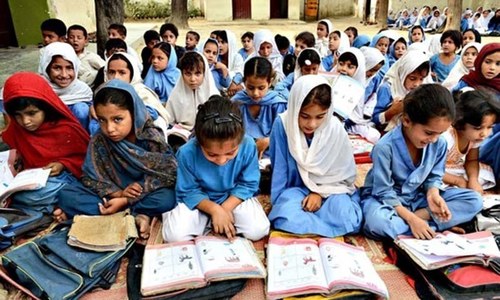A new report by The Citizens Foundation (TCF) and Thar Foundation has pointed out how countries like Pakistan — where people speak a host of regional and local languages — can adopt a ‘mother tongue-based multilingual education’ model to help increase their literacy rates.
The report, titled 'Finding Identity, Equity, and Economic Strength by Teaching in Languages Children Understand', was released on Thursday and is based on work spanning three years in Sindh's Thar district.
More than 130 practitioners, policymakers, and academics from across the world were interviewed and the language policies of similarly diverse countries were made part of the research, according to a press release by the TCF.
The non-profit organisation noted that for children who grow up in multilingual communities around the world, "diversity has become a handicap rather than a source of strength".
"In Pakistan, the response to linguistic diversity has been a blunt insistence on the national and foreign languages, Urdu and English. This has made quality education impossible for the majority of Pakistani children who grow up without exposure to these languages," TCF said in a blog.
It pointed out how educational practitioners can adopt a language progression path in which children are initially taught in their mother tongues/regional languages, then in the provincial language, then the national language, and then in an international language (English). It also laid out principles for the transition from one language to another.
"[The report] will demonstrate how GPs (guiding principles) can provide a foundation upon which decisions [can be taken] about when and in what capacity languages may be introduced. This will showcase the implementation of the guiding principles and the development of a language progression plan in a real life, linguistically heterogeneous context," the report said.
It divides stages of learning languages into three:
- First stage: Strengthen foundation in the most familiar language (mother tongue) from nursery to grade 3.
- Second stage: Gradual transition from most familiar language to less/least familiar language from grades 4 to 7.
- Third stage: Using the previously unfamiliar language as the solo medium of instruction to acquire academic proficiency and knowledge from grade 8 onwards.
"As long as children are being schooled in a language which is foreign to them, they will not be able to learn effectively. The conversation of adopting the most familiar language as the medium of instruction is not simply one of mother tongue-based multilingual education (MTB MLE), it is a matter of literacy and learning," the report said.
Read: Understanding the linguistic journey of Pakistan’s children
Implementation in Thar
A pilot project based on this language progression path was initiated in Thar in early 2020, according to the report.
"Both TCF and Thar Foundation schools implemented this research-based MTB MLE model in 21+ classrooms in Tharparkar, starting with pre-kindergarten and kindergarten.
"Students in these classrooms will transition through fluency in three or four languages over the course of their education, from diverse mother tongue languages (Dhatki and Sindhi) to the regional language (Sindhi), then the national language (Urdu), and then to an international language (English)," the report said.
Welcoming the release of the report, Zubeida Mustafa, a renowned journalist and author of ‘The Tyranny of Language in Education: The Problem and Its Solution’, commented: “Language can facilitate children’s social, cultural and intellectual development or it can hurt their capacity to learn. The failure to look at language as a crucial component of education per se has resulted in our failure to spread literacy and learning in the country."















































